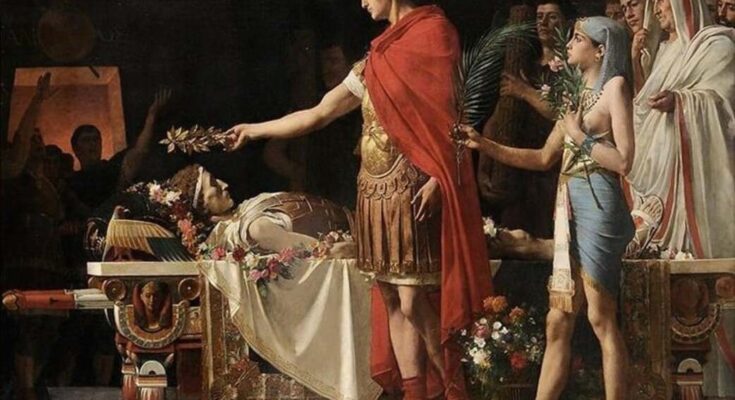Just like in modern times, many people in antiquity enjoyed visiting the tombs of famous historical figures. One of the most famous historical figures in the Greco-Roman world was Alexander the Great. According to ancient records, one of the Roman emperors visited his tomb. However, while doing so, this Roman emperor ended up breaking off Alexander the Great’s nose. Did this really happen, though?
The tomb of Alexander the Great
Alexander the Great died in the fourth century BCE in the year 323. He was buried in a magnificent tomb, which was just as famous in antiquity as it is today. It was a sarcophagus that fit his body like a glove, and it was made out of solid gold. There was an expensive, purple robe covering the torso and possibly the legs with gold embroidered on it.
Later on, Alexander’s tomb changed significantly. According to Strabo, a Greek writer of the first century CE, King Ptolemy X took the gold from Alexander’s magnificent tomb and melted it down for his own purposes.
After this, the gold tomb was replaced with one made of glass, as per Strabo. Many scholars consider it likely that this is a reference to alabaster, a type of material occasionally used for small windows due to its slight translucence. It was this “glass” tomb that one of the Roman emperors visited when he allegedly broke off Alexander’s nose. But how did this happen?
Alexander the Great’s tomb visited by a Roman emperor
The emperor in question was Augustus Caesar, the first true Roman emperor. One of the main accounts about his visit to Alexander the Great’s tomb comes from Suetonius. This visit occurred in 30 BCE, a few years before Augustus actually became emperor. At that point, he was known as Octavian.
According to Suetonius’ account, Octavian placed a gold crown on the head of the fallen king, as well as flowers on the tomb. However, there is a later account which adds another peculiar detail.
This later account comes from Cassius Dio. He lived in the late-second to early-third century CE. For reference, this is about one century after Suetonius. His version of events obviously does not hold as much weight as Suetonius’ version for this reason. But what exactly did Cassius Dio say about Octavian’s visit?
Breaking the nose of Alexander the Great
Cassius Dio’s account, which comes from Book V of his Roman History, reads:
“After this he viewed the body of Alexander and actually touched it, whereupon, it is said, a piece of the nose was broken off.”
This is all that Cassius has to say about Octavian’s visit. He does not even mention the future emperor placing the crown and flowers on the tomb. Some modern sources say that Octavian broke the nose while leaning down to kiss Alexander. Others say it occurred while Octavian was placing the crown on Alexander’s head.
However, as we can see from the original account in which this story is found, neither of those claims actually hold up. Cassius merely says that Octavian broke the nose when he touched the body. He offers no additional details.
This brief account has lead to speculation regarding its historicity. Some scholars believe that this may well have actually happened, whereas others believe it is just a bit of ancient fiction. What does the evidence really indicate?
The first thing is that Suetonius mentions nothing about this. He lived a full century closer to the event in question than did Cassius Dio. For this reason, his account is logically more reliable than that of Cassius Dio.
Of course, Suetonius does not specifically say that Octavian did not break off Alexander’s nose (although, if that story had not already circulated, why would he have?). He also does not include any information which absolutely precludes the idea. Nonetheless, this is such a remarkable incident that we would surely have expected him to have mentioned it if it had in fact happened.
Another consideration is the fact that Cassius adds the phrase “it is said” when recounting the story. This suggests that not even Cassius was fully convinced it had occurred. For these reasons, many scholars believe that the account of this Roman emperor breaking off the nose of Alexander the Great is merely fiction.



